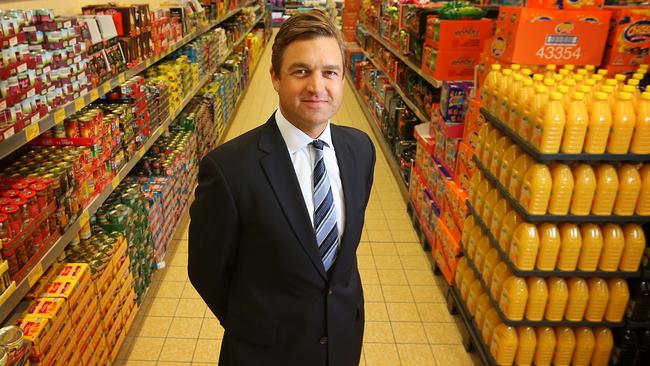Aldi’s growth slows on the Eastern Seaboard
THE supermarket upstart has had some very bad news and it’ll be music to the ears of Coles and Woolies.
SHOPPERS appear to be losing their enthusiasm for German supermarket powerhouse Aldi with the chain’s growth in the eastern states going backwards for the first time since it began trading in Australia.
Industry data obtained by the Daily Telegraphshows Aldi’s market share in NSW, Victoria and Queensland began to falter during the 2016 financial year, despite the supermarket opening new stores up and down the coast. It dropped to 11.7 per cent in June, down from 12 per cent in the same month in 2015.
It’s the first time its growth has hit a speed bump since opening its inaugural store in Bankstown 15 years ago.
The data also found Aldi’s sales on the Eastern Seaboard grew by just 0.4 per cent during June compared to June 2015 — slower than the overall market growth of 3 per cent over the same period.
This data suggests Aldi’s market share may have finally hit the ceiling in NSW, Victoria and Queensland — which will no doubt leave competitors Woolworths and Coles - as well as Metcash who supply independent IGA stores - rubbing their hands with glee.
Since arriving Down Under, the German discount retail chain, which is led in Australia by Tom Daunt, has aggressively expanded its number of stores and now has more than 400 across the country.

According to a recent report by investment bank UBS, in the medium term Aldi is targeting a total of 500 stores down the east coast of Australia as well as 130 in South Australia and Western Australia.
Aldi differentiates itself from its rivals by offering a much narrower variety of products and far more private label items at low prices. In order to compete, Woolworths, Coles, and to a lesser extent IGA, have invested heavily in price reductions to keep their sales ticking over. This has had a severe impact on Woolworths’ bottom line in particular
A spokeswoman from data company Nielsen confirmed Aldi did have a marginal decline during June and could find no other four-week period over the previous year showing such declines by the retailer.
An Aldi spokeswoman initially said the supermarket “had never had a decline in market share on either the Eastern Seaboard or nationally”, but retracted this once Nielsen confirmed its statistics.
Nielsen and Aldi both said that while data is measured monthly it is traditionally grouped into quarters.
Nielsen’s head of retailer services, Megan Treston, said that on a quarterly basis Aldi was still growing both in terms of value sales and new households visiting stores across the Australian Eastern Seaboard states.
“For as far back as I can recall, Aldi has had consistent quarter-on-quarter value growth across the Australian Eastern Seaboard,” she said.
Originally published as Aldi’s growth slows on the Eastern Seaboard



